What is revealed?
The Ballad of Frankie Lee and Judas Priest, from 1967’s John Wesley Harding, is perhaps Bob Dylan’s most enigmatic song. It is certainly one of his funniest. Over eleven verses and within a virtually unchanging musical template, it tells a convoluted ‘shaggy dog’ story about the consequences of falling into too much temptation, complete with mysterious quasi-religious overtones. It uses traditional ballad form, with no bridges or choruses, and sticks to a rigid ABABCDED format, with lines 5 and 7 not rhyming. Bass and drums (played by stalwart Nashville studio musicians Charlie McCoy and Kenny Buttrey) chug along unobtrusively in the background. Dylan relates the story calmly in a near-spoken narrative voice that recalls the moralistic and often religious homilies that Hank Williams recorded in the early 1950s as ‘Luke the Drifter’.
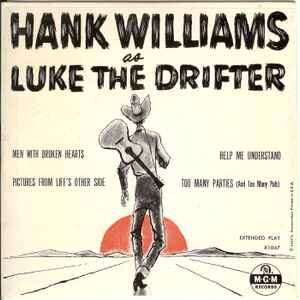
Much has been written about the deliberate parallels that Dylan draws between the characters in the song and various religious figures. Some commentators seem to treat The Ballad as if it is a serious religious allegory, meticulously attempting to force every detail to work as part of an overall moral treatise. But such approaches unfortunately appear to ignore the obvious fact that – in terms of the lyrics and Dylan’s deadpan delivery – Frankie Lee is first and foremost an extended joke. Although it plays with religious and philosophical ideas, it uses absurdity to satirise moralistic notions. Dylan may be playing a game with his audience, inviting them to read significance into the incongruous events that he recounts and then mocking them for doing so. Given that John Wesley Harding quite deliberately presents itself as a mock-austere reaction against the excesses of rock culture and psychedelia, it is possible to read the song as an allegory of how Dylan and other rock stars plunged into overindulgence in the mid-1960s. Dylan may also be taking a sly dig here at those fans, listeners or commentators who claim to have found ‘the key’ to unlock the secrets of his work.
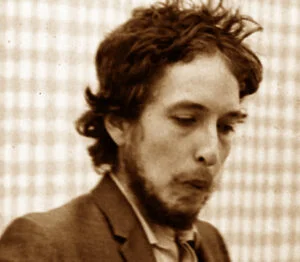
Frankie as Jesus?
In Frankie Lee Dylan creates an entirely nonsensical scenario, which he leavens with various aspects of Biblical symbolism. Frankie himself is a kind of ‘Jesus figure’ whom Judas Priest (arguably taking on the satanic role) leads into temptation. But instead of suffering in a desert and having to live off locusts, he kills himself through extreme sexual indulgence. This is, of course, hardly Jesus-like behaviour. Judas Priest, despite his name, cannot really be called satanic. If anything, he is being helpful to Frankie. But the obvious parallels with these well known mythical figures are tantalising, suggesting that Dylan is deliberately allowing his audience to construct various scenarios which appear to have some religious significance. But then, with his tongue firmly in his cheek, he brings them back down to earth.

Frank is the key…
Many of those fans who bought the album noticed the apparent links between The Ballad and Dylan’s eccentric sleeve notes. These recount a bizarre story centering around a character known as Frank, his wife Vera, his friend Terry Shute and the Three Kings who come to visit him. All three Kings have problems. One has a broken nose, another a broken arm while the third has no money. They appear to be searching for a ‘key’ to ‘Mr. Dylan’s new record’. One states that …faith is the key… Another declares …Froth is the key!… But the third king insists that the ‘key’ is Frank himself. Frank does not deny this, but his ‘explanation’ consists of the following: ….First of all, he sat down and crossed his legs, then he sprung up, ripped off his shirt and began waving it in the air. A light bulb fell from one of his pockets and he stamped it out with his foot. Then he took a deep breath, moaned and punched his fist through the plate-glass window. Settling back in his chair, he pulled out a knife, “Far enough?” he asked… This appears to be enough explanation for the Kings, who are now cured of their various malaises. Whether ‘Frank’ and ‘Frankie Lee’ are the same person is unclear. But the fact that Frank has – like Jesus – been visited by three kings suggests that he has – or they believe he has – some kind of magical healing powers. He is indeed the ‘key’ to the mysteries of the songs on the album. Yet of course his rather mad physical actions provide no real explanation at all.
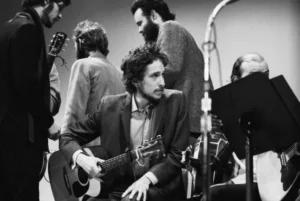
Frankie sets off…
The song has few conventional poetic images but much snappy dialogue and witty rhyming. We begin with the jaunty….Frankie Lee and Judas Priest, they were the best of friends/ So when Frankie Lee needed money one day, Judas quickly pulled out a roll of tens… This establishes the jocular mood which will be maintained throughout. ‘Frankie’ is generally considered to be a slightly mocking form of ‘Frank’ or ‘Francis’. ‘Judas Priest’ is an obvious amalgam of the name of Jesus’ betrayer (name checked by Dylan in With God On Our Side) with that of a religious official. The name suggests corruption, but this may well merely be one of the ironic jokes that pepper the song. It is then said that Judas places the money …on a footstool, above the plotted plain… The obscure phrase ‘plotted plain’ refers to an area of land that has been divided into individual plots. This may be a tongue in cheek reference to the patriotic anthem America the Beautiful, which includes the phrase ‘fruited plain’. Judas cheerfully invites Frankie to …Take your pick Frankie boy/ My loss will be your gain…

Temptation….
At first Frankie struggles over whether to accept the offer. We are told that …with the cold eyes of Judas on him, his head began to spin… Frankie seems particularly self conscious …Can you please not stare at me like that… he asks Judas …It’s just my foolish pride/ But sometimes a man must be alone, and this is no place to hide… It seems strange that Frankie is prevaricating now, as it was he who asked to borrow money in the first place. The second statement is even more puzzling, suggesting that Frankie is wrestling with some deep personal problem. Judas winks at him, leaving it up to him as to whether he will accept the money: …You better choose which of those bills you want before they all disappear!… Frankie assures him he will take the money. What follows is perhaps the song’s most bizarre moment. …Just tell me where you’ll be… he says. …Judas pointed down the road and said “Eternity” which is later qualified as …But you might call it Paradise… Frankie gives a knowing smile and says …I don’t call it anything… It seems that the pair have a mutual secret here, which they are discussing in ironically knowing terms.
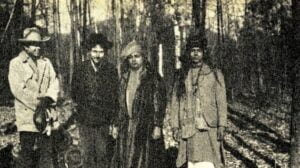
Dylan then throws several clues at us which hint at some kind of religious significance. Frankie has not departed for long before a ‘passing stranger’ is said to …burst upon the scene… We now learn that Frankie is a …gambler, whose father is deceased… The gambling clearly explains his lack of money, but the relevance of the paternal demise remains mysterious. When the stranger informs Frankie that Judas is …stranded in a house… Frankie dashes off to meet him. He asks …What kind of house is this where I have come to roam?… Judas’s equally enigmatic reply is …It’s not a house, it’s a home…. This response seems to have a considerable effect on Frankie. He is said to ‘tremble’ and lose all his self control …over everything that he had made, while the mission bells did toll…. A number of questions now hang in the air. Is Judas suggesting that Frankie has finally ‘come home’? Is the ‘house’ some kind of ‘house of worship’? What might we make of the statement about ‘everything that Frankie has made’? Is Frankie therefore some kind of Jesus figure? Is Judas really is Devil tempting Frankie? And why are the ‘mission bells’ tolling?

Enigma upon enigma…
These ‘floating enigmas’ all seem to suggest that the song is some kind of parable. Perhaps we may expect that Frankie will now have some kind of spiritual revelation. His reaction when he looks at ‘the house’ is certainly one of awe: …He just stood there staring at that big house as bright as any sun/ With four and twenty windows… We may think at first that this is some kind of church or temple until Dylan delivers the line …with a woman’s face in every one… Thus this much vaulted ‘home’ is in fact a brothel, and a rather spectacular one at that. Frankie is now overcome by a gargantuan lust. His adventures within ‘the house’ are crammed into one remarkable verse which begins …Well, up the stairs ran Frankie Lee, with a soulful bounding leap/ And foaming at the mouth, he began to make his midnight creep… A ‘midnight creep’ is a phrase that can be found in many blues songs describing such sexual adventurism. We hear that …For sixteen nights and days he raved and on the seventeenth he burst/ Into the arms of Judas Priest, which is where he died of thirst…

Dylan covers a spectacular amount of ground in these few lines. By now it has surely become obvious that the song is on one level a Biblical parody. Instead of spending forty days and nights in the desert leading the most ascetic life possible, Frankie spends sixteen days and nights indulging his carnal lusts to a ludicrous extent. In John 19:28 Jesus, in pain upon the cross, famously cries …I thirst!… In Frankie’s case, the thirst extinguishes him.

Dying of thirst…
In the famous penultimate verse, Dylan wags a cautionary finger at those who would read too much significance into the story. He begins: …No one tried to say a thing when they carried him out in jest… The presence of the phrase ‘in jest’ may possibly suggest that Frankie is not really dead at all and that the report of him ‘dying of thirst’ was merely a comic exaggeration describing a man whose lust has been so satiated. Then we meet the final character in the song, described only as …the little neighbor boy who carried him to rest… who walks …along, alone, with his guilt so well concealed… We never learn why the ‘neighbour boy’ should be feeling guilty. Some commentators have speculated that he and the ‘passing stranger’ are in fact the same person but there is no real evidence in the text for this. And if we haven’t yet grasped that the whole song is indeed a parody, we hear that the neighbour boy …muttered underneath his breath “nothing is revealed”. Having tantalised us with ten verses which appear to have some ‘spiritual’ significance, Dylan is surely telling us that the joke is on us.
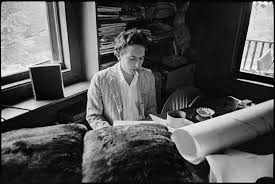
Ha ha. Or is he? Has he really recast the temptations of Christ as a country and western song featuring gamblers and prostitutes? If so, why? And what does ‘nothing is revealed’ actually signify? Can we link the mention of ‘nothing’ to the way he meditates on the word in several recently composed songs from The Basement Tapes such as Nothing Was Delivered and Too Much of Nothing? In these songs, ‘nothing’ becomes, ironically, a ‘thing’ in itself, signifying an absence of any underlying principle or logic behind the machinations of the world? As King Lear (a considerable influence on the Basement Tapes song Tears of Rage) states in his confusion at his daughter’s refusal to declare how much she loves him …Nothing will come of nothing… Lear’s world is a Godless, purposeless void – the same void, perhaps, that the ‘neighbor boy’ has identified.

The final verse is delivered in the style of a Luke the Drifter-type homily, in which the narrator traditionally delivers a moral lesson to the audience. But instead of suggesting some spiritual truth, the advice given here is merely simple and practical: …The moral of this song/ Is simply that one should not be where one does not belong… Then there is another reference to ‘neighbourliness’: ..And if you see your neighbor carrying something, help him with his load… Despite all the religious symbolism that is hinted at – and often parodied – in the song, the important ‘spiritual’ task here is merely to be helpful to one’s fellow human beings. But Dylan has one final admonitory twist to deliver: …and don’t go mistaking Paradise for that home across the road… The serious point here seems to be that excessive hedonism is not in itself a route to happiness, spiritual contentment or ‘salvation’.
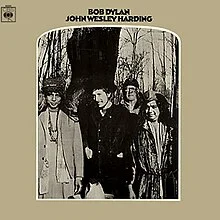
What is revealed?
The Ballad of Frankie Lee and Judas Priest is in many ways it is an object lesson in Dylan’s use of ambiguity. It can be seen as a deliberate parody, not only of religious symbolism but also of those fans who exalted him to the status of a prophet, frequently misinterpreting his lyrics in terms of their ‘spiritual significance’. One particularly crazed ‘Dylanologist’ A.J. Weberman, whose analyses of Dylan’s lyrics spilled over into disturbing paranoia, seemed to think that Dylan should be some kind of political leader of ‘The Movement’ and that his lyrics were written in some kind of secret code, within which were ‘instructions’ to his followers as to how to start ‘The Revolution’. Many years later, in Chronicles Vol. One Dylan would make clear how much he despised those who tried to place him in such a role:
…I was sick of the way my lyrics had been extrapolated, their meanings subverted into polemics and that I had been anointed the Big Bubba of Rebellion, High Priest of Protest, the Czar of Dissent, the Duke of Disobedience, Leader of the Freeloaders, Kaiser of Apostasy, Archbishop of Anarchy, the Big Cheese…
In Frankie Lee Dylan strings such followers along, placing plenty of ‘clues’ in front of them and then deliberately leaves them unexplained. They will, of course, be hoping for a final revelation in the song. When it is finally delivered, by the ‘little neighbor boy’, however, it is strongly suggested that all these clues were meaningless. Nothing, indeed is revealed. Yet in that very ‘anti-revelation’ itself there is a kind of cry for the poet within Dylan to be released from the pressures of over expectation and over veneration which were clearly driving him to distraction. So much so, in fact, that he was now about to retreat from the public eye for seven years (during which he was only to play one major concert) and present his public with a series of songs that (or so he hoped) could decidedly not be over interpreted.


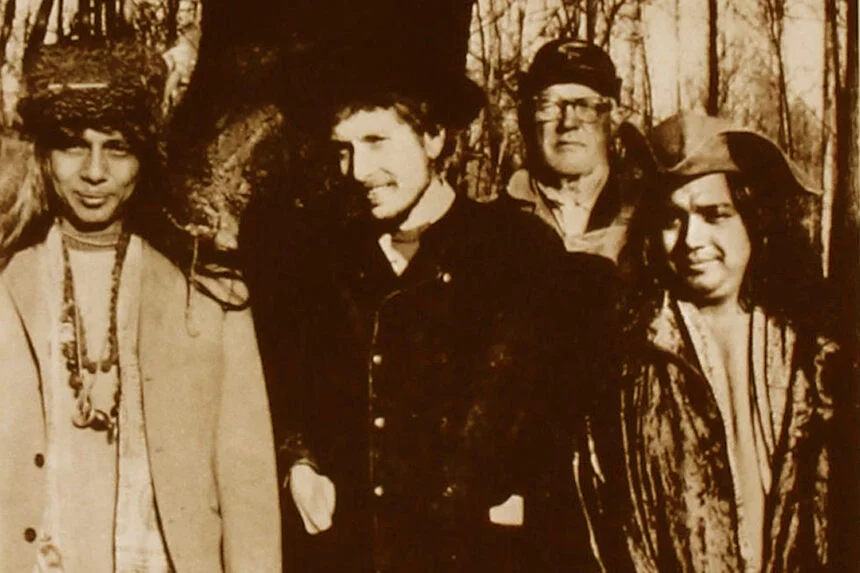
Leave a Reply